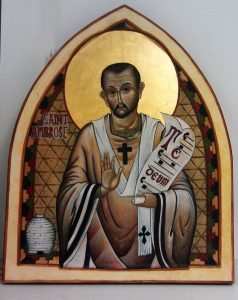 We come today to the feast of the greatest Archbishop of Milan, Saint Ambrose. He served at a time when Milan was the center of the Empire. We know historically that Ambrose was elected bishop when he was still a catechumen (not yet baptized). The faithful had a suspicion that the excellent civil servant would prove to be most competent churchman: in theology and sacred Liturgy, in administration, and a holy and sincere Christian. Saint Benedict recommends his hymns in the Rule and traditionally think that the “Te Deum” hymn is ascribed to him.
We come today to the feast of the greatest Archbishop of Milan, Saint Ambrose. He served at a time when Milan was the center of the Empire. We know historically that Ambrose was elected bishop when he was still a catechumen (not yet baptized). The faithful had a suspicion that the excellent civil servant would prove to be most competent churchman: in theology and sacred Liturgy, in administration, and a holy and sincere Christian. Saint Benedict recommends his hymns in the Rule and traditionally think that the “Te Deum” hymn is ascribed to him.
Born of a noble Roman family in Gaul around the year 340, Ambrose studied in Rome and served the imperial government at Sirmium. In 374, elected bishop of Milan, and ordained on this date. Saint Ambrose died April 4, 397. The Pope proclaimed Saint Ambrose a Doctor of the Church in 1298; he is honored as the patron saint of beekeepers and candle makers, because of the honeyed words of his preaching.
The image here of the saint hangs at Newark Abbey (Newark, NJ).
Ambrose’s civil experience as governor allowed him the skill of knowing how “to talk to power.” When the Emperor Theodosius had 7,000 Thessalonians slaughtered over the assassination of their governor, he excommunicated him for his horrendous crime – and made it stick, bringing Theodosius to repentance.
As a theologian, Bishop Ambrose wrote about the incarnation of the Son of God:
“And the Word was with God . This that he said is to be understood thus: The Word was just as was the Father; since He was together with the Father, He was also in the Father, and He was always with the Father. […] It is of the Word to be with the Father; it is of the Father to be with the Word, for we read that the Word was with God. So if, according to your opinion, there was a time when He was not, then, according to your opinion, He too was not in the beginning with whom was the Word. For through the Word I hear, through the Word I understand that God was. For, if I shall believe that the Word was eternal, which I do believe, I cannot doubt about the eternity of the Father, whose Son is eternal.” (The Sacrament of the Incarnation of our Lord (III, 15-18, from the Vatican web site)